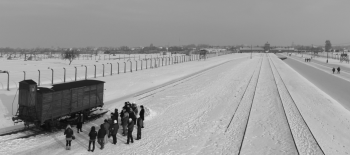Free Online History Course
Women and Resistance in the Warsaw Ghetto
REGISTER April 18-May 16, 2023
Organized by POLIN Museum of the History of Polish Jews
This event is recommended by the Polish Cultural Institute New York.
The Warsaw Ghetto Uprising was one of the most famous acts of Jewish rebellion during the Holocaust. What was daily life like for women in the ghetto? What forms did their resistance take, and how did it reinforce or challenge gender roles? How are historians and activists today broadening our understanding of this critical moment in history? This spring, join the Jewish Women’s Archive and POLIN Museum for a special Online History Course focusing on women’s lives and resistance in the Warsaw Ghetto.
- Each session will be held online.
- Participants will receive a link to each webinar prior the event.
- Each session will be recorded and available at a later date for each registered participant.
Program
April 18 (Tuesday), 12:00 PM EDT: Warsaw Ghetto Through Women’s Eyes, with Katarzyna Person.
Discover the history of the Warsaw ghetto from the perspective of women who lived and died there. This includes writers, students, vegetable sellers, and homemakers. Their experiences, choices, and fates make up a complex chapter in the history of the Holocaust.
Katarzyna Person is an assistant professor at the Jewish Historical Institute in Warsaw. She is the editor of the complete edition of the Ringelblum Archives, and author of several books.
April 25 (Tuesday), 12:00 PM EDT: Rachela Auerbach at the Frontline of the Struggle, with Karolina Szymaniak.
Polish-Yiddish writer Rachela Auerbach was a member of the underground Warsaw ghetto Ringelblum Archive. Learn about her work for Jewish Social Self-Help, her documentation efforts as a means of civil resistance, and her post-war works on the Warsaw Ghetto Uprising.
Karolina Szymaniak is an assistant professor at the University of Wrocław, and research fellow at the Jewish Historical Institute in Warsaw. Her edited collection of Auerbach’s ghetto writings received the 2016 Polityka History Award.
May 2 (Tuesday) 12:00 PM EDT: Dorka Goldkorn and other Communists in the Ghetto, with Joanna Ostrowska.
The Warsaw Ghetto’s female fighters, especially those of communist leanings, have been mostly forgotten. Dorka Goldkorn’s life offers a window into their collective story, giving a unique glimpse into the lives of young Jewish women involved in the radical leftist movement before World War II.
Joanna Ostrowska researches forgotten victims of the Holocaust, and the queer history of World War II. She is the author of Unmentioned: Sexual Forced Labor during World War II.
May 9 (Tuesday), 12:00 PM EDT: The Interwar Roots of Military Resistance of Jewish Women in the Ghetto, with Katarzyna Czerwonogóra.
During the Nazi occupation of Europe, Jewish women took on new roles as military fighters. Explore the background of women in the resistance, including preparation in the Zionist movement, and new models of Jewish femininity that emerged in interwar Poland.
Katarzyna Czerwonogóra is a scholar of Jewish women who lives in Jerusalem and Warsaw. She studies local and international mobilization of Zionist women in Germany and Poland.
May 16 (Tuesday), 12:00 PM EDT: Herstories of Resistance, with Zuzanna Hertzberg.
Look at the women’s individual and collective resistance during the Shoah as a turning point of a long history of women revolt. How did Jewish women acquire skills to fight the oppression? How can their strategies be applied to the battles we fight today? How to bring the archive to the streets and give it new life?
Zuzanna Hertzberg is a Polish-Jewish interdisciplinary artist, activist, and researcher. She is interested in the interweaving of individual and collective memory, the restitution of minority heritage, and the marginalization of uncomfortable narratives.
The course is organized within the Global Education Outreach Program.

This program was made possible thanks to Taube Philanthropies, the William K. Bowes, Jr. Foundation, and the Association of the Jewish Historical Institute of Poland.

Organizer




